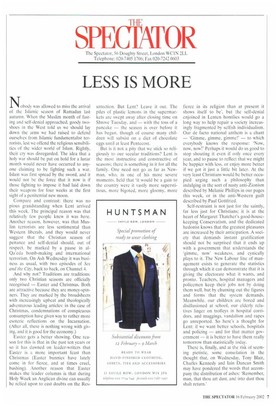SPECTATOR
The Spectator, 56 Doughty Street, London WC1N 2LL Telephone: 020-7405 1706; Fax 020-7242 0603
LESS IS MORE
Nobody was allowed to miss the arrival of the Islamic season of Ramadan last autumn. When the Muslim month of fasting and self-denial approached, goody twoshoes in the West told us we should lay down the arms we had raised to defend ourselves from Islamic fundamentalist terrorists, lest we offend the religious sensibilities of the wider world of Islam. Rightly, their cry was disregarded. The idea that a holy war should be put on hold for a lunar month would never have occurred to anyone claiming to be fighting such a war. Islam was first spread by the sword, and it would not be the force that it now is if those fighting to impose it had laid down their weapons for four weeks at the first sight of a penitential new moon.
Compare and contrast: there was no pious grandstanding when Lent arrived this week. The principal reason was that relatively few people knew: it was here. Another reason, however, was that Muslim terrorists are less sentimental than Western liberals, and they would never suggest that the Christian season of penance and self-denial should, out of respect, be marked by a pause in alQa'eda bomb-making and international terrorism, On Ash Wednesday it was business as usual, with two episodes of Sex and the City, back to back, on Channel 4.
And why not? Traditions are traditions: only two Christian seasons are officially recognised — Easter and Christmas. Both are attractive because they are money-spinners. They are marked by the broadsheets with increasingly upbeat and theologically adventurous leading articles: in the case of Christmas, condemnations of conspicuous consumption have given way to rather more esoteric reflections on the Incarnation. (After all, there is nothing wrong with giving, and it is good for the economy.) Easter gets a better showing. One reason for this is that in the past ten years or so it has dawned on leader-writers that Easter is a more important feast than Christmas (Easter bunnies have lately come in for fierce, and at times cruel, bashing). Another reason that Easter makes the leader columns is that during Holy Week an Anglican divine can usually be relied upon to cast doubts on the Res urrection. But Lent? Leave it out. The piles of plastic lemons in the supermarkets are swept away after closing time on Shrove Tuesday, and — with the toss of a pancake — the season is over before it has begun, though of course many children will subsist on a diet of chocolate eggs until at least Pentecost.
But is it not a pity that we stick so religiously to our secular traditions? Lent is the most instructive and constructive of seasons; there is something in it for all the family. One need not go as far as Newman, who, in one of his more severe moments, held that 'it would be a gain to the country were it vastly more superstitious, more bigoted, more gloomy, more fierce in its religion than at present it shows itself to be', but the self-denial enjoined in Lenten homilies would go a long way to help repair a society increasingly fragmented by selfish individualism. Our de facto national anthem is a chant — 'Gimme, gimme, gimme' — to which everybody knows the response; 'Now, now, now!' Perhaps it would do us good to stop shouting it even if only once every year, and to pause to reflect that we might be happier with less, or enjoy more better if we got it just a little bit later. At the very least Christians would be better occupied urging such a philosophy than indulging in the sort of nasty anti-Zionism described by Melanie Phillips in our pages this week, or in the anti-Western guilt described by Paul Gottfried.
Self-restraint is not just for the saintly, far less just for Christians; it is at the heart of Margaret Thatcher's good-housekeeping Conservatism, and the dedicated hedonist knows that the greatest pleasures are increased by their anticipation. A society that demands instant gratification should not be surprised that it ends up with a government that understands the 'gimme, now' weakness, and cynically plays to it, The New Labour line of management exists to generate the statistics through which it can demonstrate that it is giving the electorate what it wants, and pronto. Teachers, hospital managers and policemen keep their jobs not by doing them well, but by churning out the figures and forms that the system demands. Meanwhile, our children are bored and disillusioned at school, our elderly relatives linger on trolleys in hospital corridors, and muggings, vandalism and rapes go unreported. So here's a thought for Lent: if we want better schools, hospitals and policing — and for that matter government — it is better to have them really tomorrow than statistically today, There is, finally, and at the risk of seeming pietistic, some consolation in the thought that, on Wednesday, Tony Blair, Charles Kennedy and bin Duncan Smith may have pondered the words that accompany the distribution of ashes: 'Remember, man, that thou art dust, and into dust thou shalt return.'




































































 Previous page
Previous page